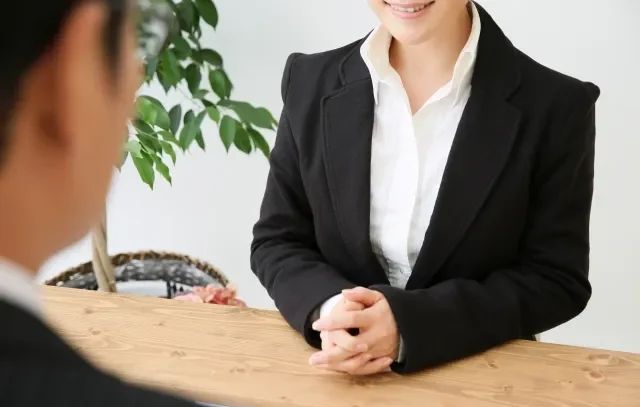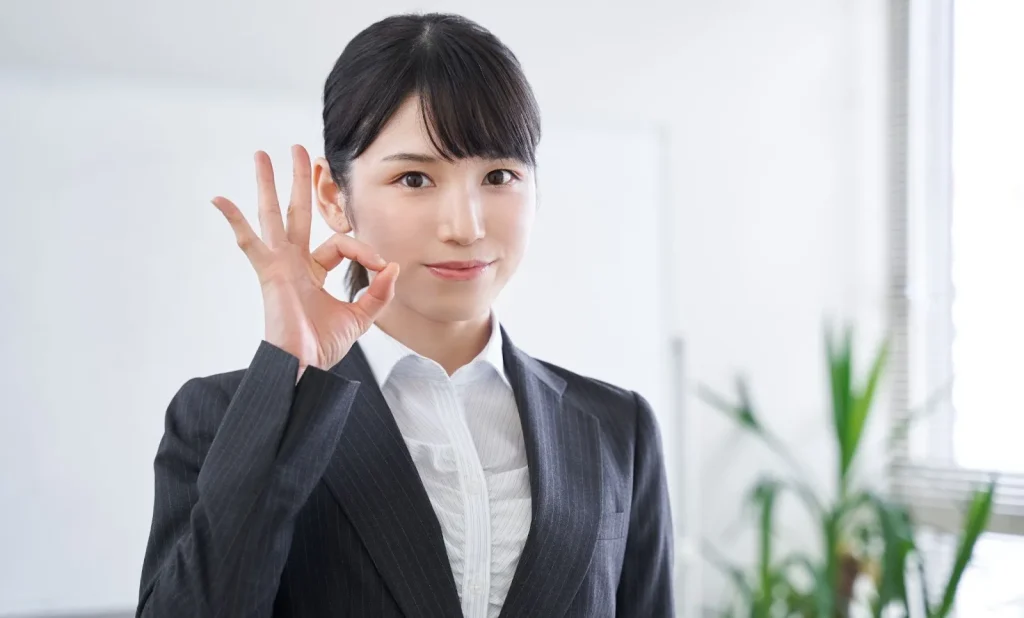How do foreigners get an interview for a job in Japan? Manners and flow explained

Interviews can be a major obstacle for foreign nationals seeking employment in Japan. One of the reasons for this is the unique interview style and mannerisms in Japan.
Compared to other countries, interviews in Japan have many unique rules. Therefore, foreign nationals who are interviewing in Japan need to overcome cultural barriers in addition to language barriers.
However, Japanese interview rules and etiquette are not difficult to learn if you know them. With advance preparation and practice, anyone can acquire the skills to handle them.
This article provides a detailed explanation of interview etiquette, flow, frequently asked questions and sample answers, and other information that non-Japanese job seekers in Japan should know when they are interviewed for a job. If you are a foreigner seeking employment in Japan, please refer to this article to help you prepare for your interview.
▼Goandup Picks Click here for recommended articles!
- Required before studying abroad! Goandup Nihongo+, an online Japanese language learning service
- This page introduces services for foreigners who wish to study in Japan or improve their Japanese language skills to learn Japanese online.
- Goandup Salon" community for foreigners living in Japan
- We introduce an online community where foreigners living in Japan can exchange information and interact with each other to support their life in Japan.
- Goandup Study" supports foreigners who want to study in Japan.
- This section introduces study abroad support services that provide comprehensive support to foreigners who wish to study in Japan, from preparation for study abroad to living in Japan.
- Where can I buy a prepaid SIM in Japan? Recommended SIM cards for foreigners are also introduced.
- How to purchase a prepaid SIM and suitable SIM cards for foreigners.
- The Complete Guide to Pocket Wi-Fi in Japan for Foreigners!
- We introduce how to select and recommend pocket Wi-Fi products that can be used conveniently in Japan.
- The Complete Guide to Finding a Job in Japan! Finding a job, changing jobs, and part-time work for foreigners
- This site provides foreigners who want to work in Japan with comprehensive information on how to find a job, recommended job sites, and other information necessary to find a job.
What are the characteristics of job interviews in Japan?

Interviews play a very important role in job hunting in Japan. Especially for non-Japanese, understanding the unique Japanese interview etiquette and characteristics is the key to success in interviews.
While there are the same basic rules for interviews in Japan as in other countries, at the same time there are several characteristics that are unique to Japan. In particular, the detailed manner and formality of interviews and the fact that personality and character traits not directly related to the job are also subject to evaluation are major characteristics of interviews in Japan. It is important to be well prepared for these characteristics.
Manners and formalities are set.
Japanese interview etiquette and formality is very detailed, from how to knock on the door to how to sit in a chair. For example, when entering an interview room, knock on the door three times before saying, "Excuse me," and bow to the interviewer before taking your seat. Also, when sitting down, remain standing until the interviewer says, "Please have a seat.
If you make a mistake in these manners, it could result in a major negative point in your first impression. Therefore, it is important to confirm and practice basic manners and formality in advance.
Personality and character are also seen.
In interviews in other countries, such as Europe and the U.S., it is common that the main focus of the evaluation is the person's work ability and experience, but in Japanese interviews, in addition, questions about personality and character are often asked.
For example, "What are your strengths and weaknesses?" What are your hobbies? are common questions asked in interviews in Japan. The purpose of these questions is to determine whether you will fit in with the organization, in addition to predicting your work performance.
Japanese companies tend to emphasize the personality and character of their employees, so you will be expected to demonstrate not only your work ethic, but also the kind of person you are. It is a good idea to prepare in advance so that you can communicate your personality, hobbies, and past experiences in a positive manner.
Interview Process in Japan

The basic flow of an interview in Japan is much the same as in other countries. You enter the interview room, answer the interviewer's questions, and finally leave the room. However, it is important to note that there are certain manners and etiquette that are unique to Japan at each stage of the process. Let's take a closer look at the interview process step by step.
1. enter the interview room
In Japanese interviews, there are several rules on how to enter the interview room. First, knock on the interview room door three times. When the interviewer says, "Please come in" or "Come in," open the door and step inside, then say, "Excuse me," before entering.
Upon entering the room, bow to the interviewer and say, "Pleased to meet you. Then, close the door quietly and walk to the side of the chair. At this point, be careful not to walk with large steps or close the door violently.
2. sit on a chair
When you arrive next to the chair, bow again to the interviewer. Then, give a brief greeting such as "よろしくお願いします," but do not sit down immediately and remain standing as you are.
When the interviewer says, "Please have a seat," or "Please sit down," follow the instructions and be seated. The basic seating posture is to sit deeply in the chair, with your back straight and your hands resting naturally on your knees. Avoid sitting shallowly in the chair or leaning against the backrest.
3. answer the questions
Once you are seated at the interviewer's request, the interview begins. Interviews in Japan are said to be relatively long, lasting from 30 minutes to an hour, although some positions or companies may require longer.
Questions are usually asked in Japanese. However, if a company is actively recruiting non-Japanese, interviews may be conducted in their native language, such as English. It is a good idea to confirm in advance which language the interview will be conducted in.
Questions will cover a wide range of topics, including self-introduction, reasons for applying, past experience, and future career plans. You may also be asked unexpected questions, so you are expected to be flexible. Be concise and clear in your answers, and be sure to include specific examples.
4. leave the meeting
When the interviewer says, "This concludes the interview," this signals the end of the interview. Say, "Thank you very much," and then get up from your chair.
After standing up, bow again to the interviewer and say "Thank you". Then exit the room with slow steps, looking toward the interviewer. Bow one last time at the door, then quietly close the door and exit the interview room.
The above is the general flow of a job interview in Japan. By keeping these basic manners in mind, you will make a good impression. It is also important to keep in mind that there are slight variations from company to company.
Interview Manners in Japan

Japanese interviews are characterized by the detailed mannerisms required. These manners are a reflection of Japanese culture and values. For non-Japanese, some of these manners may be unfamiliar, but it is necessary to learn them well for a successful interview. Here are three unique Japanese interview manners that foreigners in particular should know.
Pay attention to your appearance during the interview.
In interviews at Japanese companies, personal appearance is also a subject of evaluation. In particular, it is important to note that the standards of personal appearance required in business situations may differ from country to country.
The following are the key points of personal appearance required for interviews in Japan.
- Suits should be plain and simple in design, such as black or navy.
- Shirts and blouses should be white or light colored and clean
- Keep hair neatly coiffed and bundled at the ends if long.
- Keep jewelry to a minimum and avoid flashy items.
- Cut nails short and avoid nail polish.
- use perfume sparingly
By keeping these things in mind, you will make a good impression on the interviewer. Your appearance will also give you confidence in yourself. Make it a habit to check your appearance in front of a mirror before going in for an interview.
The standards of personal appearance required by Japanese companies are not limited to business situations, but are equally important in students' job-hunting activities.
Arrive early
In Japan, being late for an appointment is strictly prohibited. Punctuality is very important not only in interviews but also in business situations.
Therefore, be sure to arrive early for the interview. Generally speaking, it is best to arrive at the venue 10 to 15 minutes before the start of the interview.
For example, if the interview starts at 10:00, it is ideal to arrive at the venue around 9:45 to 9:50. Please note that arriving exactly at the start time may be perceived as being almost tardy in the Japanese sense.
In the unlikely event that your arrival will be delayed due to a train delay or other unavoidable circumstances, it is important to contact us in advance. Explain the situation and express your apologies.
Check the time on your watch, not on your phone.
During a job interview in Japan, it is considered rude to take out your smartphone to check the time during the interview. Using a smartphone can give the interviewer the impression that you are being insincere.
Therefore, during the interview, be sure to check the time on your watch, not on your smartphone. As mentioned above, punctuality is required during interviews, so a watch is a must.
If you do not wear a watch on a regular basis, purchasing one for a job interview would be an option. It does not have to be an expensive watch, but a simple, elegant design appropriate for business situations is recommended.
By being aware of these detailed manners, you will make a good impression on the interviewer.
Common Interview Questions and Answers in Japan

For non-Japanese, interviewing in Japanese can be a big pressure. Especially if you do not know what questions you will be asked or how to answer them, you may feel even more nervous.
Therefore, in order to ease interview nerves, it is effective to anticipate questions and prepare answers in advance. Many interview questions in Japan are patterned to some extent, so if you prepare well, you will be able to face the interview with confidence.
Here we discuss two common questions asked at interviews for new graduate hires in Japan and provide sample answers. Please take a look at them for reference.
Please introduce yourself."
Self-introduction is a question that is always asked at the beginning of an interview. Here, it is important to briefly highlight your experiences and strengths as a student.
An example of a response might take the form of the following
My name is △△, and I am a member of the Faculty of XX Faculty of XX University. At university, I belonged to the □□□ club, and as a leader, I improved my communication skills by organizing the members. In addition, during the summer of my sophomore year, I did an internship at a company in the same industry as yours. At that time, I became interested in the field of ◇◇, and since then I have been studying it on my own initiative. I believe that my strengths are my positive attitude toward everything and my high level of curiosity about a wide range of fields. This is my self-introduction. I look forward to working with you today.
In this self-introduction, I specifically mention my college experience while also highlighting activities and interests related to the company's industry. It also briefly touches on your strengths.
In self-introductions, it is best to make the subject and predicate clear, such as "I am -" or "I think I am -," to give a clear impression.
Why do you want to work for us? What is your reason for wanting to work for us?
Questions about one's motives for applying for a job appear very frequently in interviews for new graduates in Japan. Rather than simply giving a superficial answer such as "because I am interested in your company," you are expected to explain in detail, relating the company's features to your own experience and career vision.
Sample responses are as follows
The first is that I share your company's corporate philosophy of "____. When I was in college, I worked on the "□□" project in the "□□" circle and tried to solve the problems of ◇◇. Through this experience, I have developed a strong desire to provide value to society and be of service to people. Second, I was attracted to your◇◇ business. I learned about XX in my university classes, and I used the knowledge I gained there to gain experience in XX during my internship. At that time, I strongly felt that I was suited for the job and that it was worthwhile, and I came to think that I would like to be active in this field. Your company's ◇◇ business is a leader in the industry, and I would like to hone my skills here."
In this sample response, you specifically state how your experience and values match with the corporate philosophy, and how your skills and vision match with the business.
In addition, "Gosha" is an honorific expression referring to the other party's company. It is also important to use these honorific expressions appropriately in interviews.
Prior company research and self-analysis are essential in answering the motivation for applying. It is important to reexamine the connection between yourself and the company and come up with specific reasons.
Tips for a successful interview in Japan

So far, we have looked at the characteristics, etiquette, and frequently asked questions of Japanese interviews. Finally, we will introduce two tips for a successful interview in Japan.
speak plainly
In an interview, you must present yourself in a limited amount of time. Therefore, it is important to speak concisely and clearly.
You may be concerned about your Japanese language ability, especially if you are a foreigner. However, rather than trying to speak perfect Japanese, try to communicate in your own language.
The basic rule of thumb is to answer the interviewer's questions by stating your conclusion first, and then briefly explain the reason or background for your answer. It is best to allow 30 seconds to one minute to answer each question.
For example, "What are your strengths?" the answer would be as follows.
My strength is persistence. The reason for this is that in a previous project I was in charge of, when faced with a difficult problem, I did not give up, tried again and again, and was finally able to solve the problem. This is the kind of attitude I hope to bring to my future assignments."
In this way, the answer can be easily conveyed to the interviewer by stating the conclusion and explaining it with specific reasons and experiences.
Study honorifics.
In Japanese language interviews, the use of honorific expressions is a key point of evaluation. Honorifics are the rules for showing respect to others and are essential in business situations.
Some non-Japanese may not use honorifics very often in daily conversation. However, they are expected to use correct honorifics in interviews.
Therefore, we recommend that you review the basic rules of honorific expressions before the interview. The following three types of honorifics are particularly important.
- Honorifics: Words that politely express the action or condition of the other person (e.g., osshiru, iraru)
- Humble words: Words that express one's actions in a humble manner (e.g., ask, see)
- Polite language: Words that speak politely to the other person (e.g., desu, masu)
By using these honorifics appropriately, you will make a good impression on the interviewer.
Please check the following article for a more detailed explanation of how to use honorifics in job hunting.
▶︎ Ten commonly mistaken business honorifics! Japanese to watch out for in job hunting and at work
In addition, interview preparation is not the only point that foreigners should keep in mind when job hunting in Japan. It is necessary to acquire a broad knowledge of how to write a resume, how to find a job, and so on. Please refer to the following article for a detailed explanation.
In addition, interview preparation is not the only point that foreigners should keep in mind when job hunting in Japan; there are many other points to keep in mind, such as how to prepare for the aptitude test called the SPI test, how to write a Japanese resume, how to find a job, and so on.
Please refer to the following article for a detailed explanation of these issues.
[What is the SPI test? Contents, format, practice questions, and countermeasures for foreigners.]
[How to write and obtain a Japanese resume for foreigners]
Serious employment support to help you realize your dream of working in Japan!

Do you want to work in Japan?
Let us "Goandup" make that dream a reality!
【 Program Features 】
✅ JLPT N3 level Japanese language acquisition
✅ Thorough preparation for the specific skills test
✅ Full support for job hunting in Japan
Business-focused one-on-one lessons will help you find a job in Japan in the shortest possible time.
【 Program Menu 】
- Individual Japanese language lessons
- Intensive curriculum to obtain N3, especially specialized lessons for business Japanese that can be used at work.
- Intensive curriculum to obtain N3, especially specialized lessons for business Japanese that can be used at work.
- Preparation for the Specific Skills Test
- Customized materials for specific skill tests will be used to focus on frequently asked questions and learning to pass the test.
- Customized materials for specific skill tests will be used to focus on frequently asked questions and learning to pass the test.
- Resume and CV support
- To create resumes and CVs tailored to Japanese corporate culture, and to brush up on self-promotion and motivation for application.
- To create resumes and CVs tailored to Japanese corporate culture, and to brush up on self-promotion and motivation for application.
- Interview Preparation
- Guidance on areas for improvement through mock interviews and feedback based on corporate interview scenarios. Learn interview etiquette and behavior unique to Japan.
- Guidance on areas for improvement through mock interviews and feedback based on corporate interview scenarios. Learn interview etiquette and behavior unique to Japan.
- career consulting
- Provide introductions to companies that match the participant's career goals, select companies to apply to, and provide advice on the level of knowledge required by the companies to which the participant is applying.
- Provide introductions to companies that match the participant's career goals, select companies to apply to, and provide advice on the level of knowledge required by the companies to which the participant is applying.
- Chat Support
- In addition to one-on-one individual lessons, we also accept casual questions via DM (visa application, living support, assistance in finding a room, etc.).
If you are serious about your career in Japan, join us now!
▶︎ for more informationclick here.
We will do our best to support your success in Japan!
summary
Interviews are an extremely important part of the job hunting process in Japan. Especially for non-Japanese, there are many points to keep in mind, such as manners and question trends unique to Japan.
In this article, we have discussed in detail the characteristics and etiquette of interviews in Japan, common questions and sample answers, and tips for a successful interview. The key points are summarized as follows.
- Japanese interviews require fine manners and formality.
- Personality and character are often a part of the evaluation process.
- Understand the basic flow of the interview process and the manner in which to conduct each situation.
- Arrive 10-15 minutes before the interview and check your watch for the time.
- Anticipate frequently asked questions and prepare answers.
- It is important to speak clearly and use proper honorifics
Based on these factors, careful preparation and practice are the keys to getting through the interview process.
If you are a foreigner seeking a job in Japan, please refer to this article to help you prepare for your interview. Japanese interviews have many unique rules, but once you get the hang of it, you will surely be able to overcome them.
I wish you all a fruitful job search in Japan. We wish you the best of luck in your job search in Japan!
Interview preparation is not the only key to success in finding a job in Japan. There are many important points to keep in mind, from how to search for a job, to preparing application documents, to obtaining a visa.
To get an overall picture of such job-hunting activities in Japan, the following article may be helpful. We highly recommend reading this article as a guide to job search for foreign residents.
Your support will help us!
Thank you for visiting Goandup Picks. Our mission is to provide you with more useful information to show the world what Japan has to offer.
Your support will help us to further enhance our activities, so please support us!






